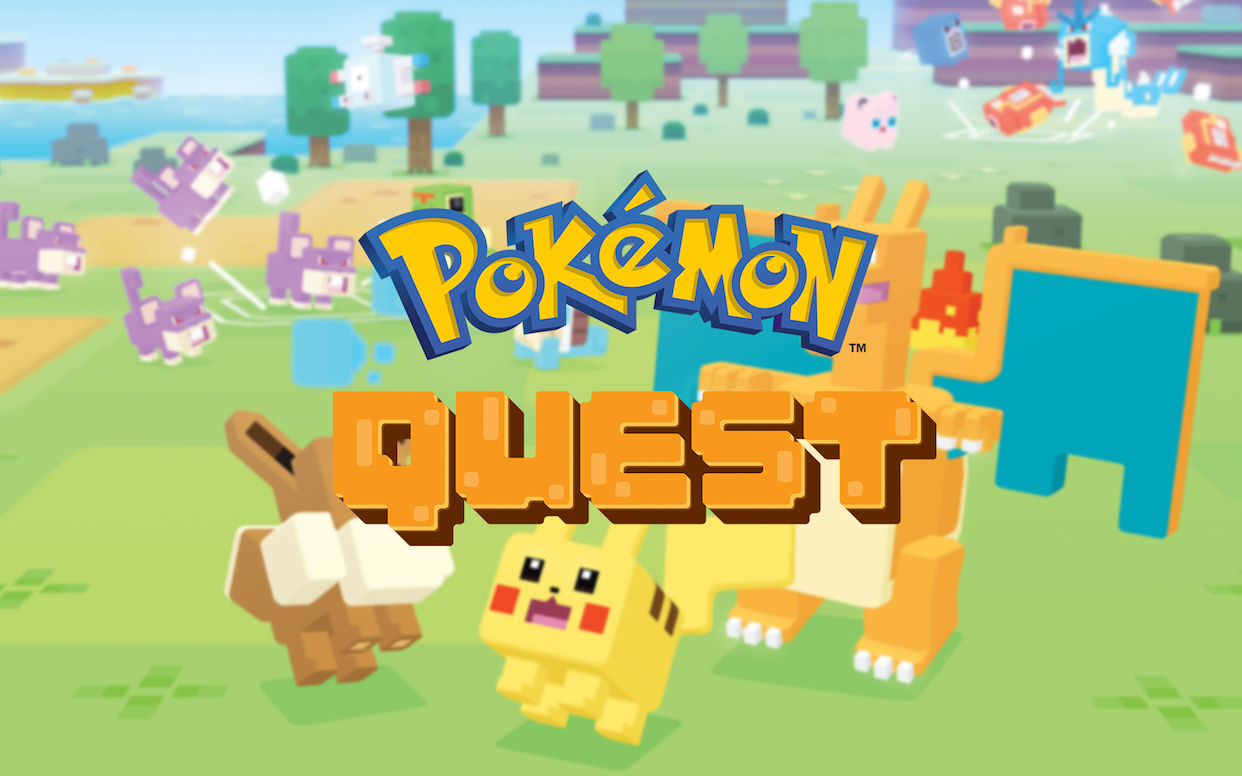Pokémon Quest
Game FreakThe Pokemon CompanyNintendo SwitchMay 30, 2018
On May 29, 2018, Nintendo announced not one, not two, but three new Pokémon games! Of those three, one dropped in the Nintendo Store that day: Pokémon Quest, a cute, mobile-type game that lets you raise Pokémon and go on small island adventures. Pokémon Quest is free to play, incredibly cute, and completely focused on the Pokémon you meet, but sparse features and repetitive gameplay might limit the staying power it has in people’s lives.
Pokémon Quest starts by dropping you, an unseen researcher and explorer, on remote Tumblecube Island. Tumblecube Island is populated by Pokémon from the Kanto region (and only the Kanto region, though I’m hoping that other regions will be introduced if the game expands), and the first thing you do is choose a starter. I chose Squirtle because I am, and will always be, precious water-turtle trash. Once you’re on the island proper, the game takes you on a whirlwind training tour of its features: you can go on expeditions in the wilderness with your Pokémon, cook food to attract new Pokémon (making them your “buddies”), train your buddies to learn new moves and gain experience, equip strengthening items to your Pokémon and their moves, and… that’s it.
In their downtime, your Pokémon buddies all gather by the cooking pot. I originally thought this was a glitch, before I realized that they’re STACKED ON TOP OF EACH OTHER. These weird island monsters are perfect, and I love them.
Expeditions are the core of Pokémon Quest. The game gives you a “battery” with five charges that refill over time, and each expedition uses one charge. You can spend real money to recharge the battery more quickly, but so far I’ve found that I don’t need to—five expeditions is about all that can hold my attention in one go, though I’m happy to come back and do more after a break. Cooking is free, but dishes need to simmer for a certain number of expeditions before new Pokémon arrive. Training and fussing with your equipment are also free (in terms of battery charges), but all of this is done in the interest of going on more dangerous expeditions, and in order to train you have to sacrifice one or more of your buddies. No, I’m not joking—during training, your chosen Pokémon faces off against a few of its friends, and at the end of the match the friends leave the camp forever. Sacrifice.
There’s something Pokémon Go-esque about the way the pieces feel scotch-taped together.
The narrowness of Pokémon Quest’s features—you can’t even nickname your buddies, nor can you pet them—leaves the game seeming incredibly sparse, and the combination of the microtransaction model and touch-based controls make it feel distinctly mobile-oriented. So much so, in fact, that it has me questioning Nintendo’s decision to release the game on the Switch before iOS or Android (which releases on June 27). The Switch’s Joy-Cons can actually be a hindrance while playing: Pokémon Quest’s UI is designed to be tapped, and the Joy-Cons override the touchscreen for a full second, leaving you hanging mid-battle if you accidentally nudge them.
The sparse, somewhat unfinished feeling of Pokémon Quest exists in its aesthetic as well: the text design feels almost pasted on in some spots, like an unfinished mockup; I’ve spotted multiple grammatical errors, and some of the phrasing feels awkward and clunky, as if the localization team ran out of time to do a final pass; and the UI on the stat management screen—my favorite tinkery part of the game—is cumbersome and tiring. The tutorial also somehow forgets to teach you about training your Pokémon, so I spent an hour or so wondering what my quest list meant by “Move Learning Training” until I just happened to tap the right button while shifting around my team. That’s when I learned about the sacrifice… and when I noped out of training for a long, long while.
On the other hand, Pokémon Quest has a delightful, encouraging spirit. I love trying out new dishes and meeting the Pokémon who wander into my camp. Sometimes, two Pokémon will wander in together, and one will dash up to the cooking pot and stick its face directly up to mine while the other will stay shyly by the sidelines, waiting for me to invite it into my circle. I’m finding myself increasingly attached to the Pokémon who have become my core team, choosing to send them out on expeditions instead of the stronger Pokémon that have come into my camp more recently. Despite the tedium of doing the same four expeditions over and over, I love accompanying them on their journeys and watching them toddle determinedly towards their goal. These tiny digital creatures feel as though they have genuine personalities, and it’s refreshing to play a game that lets me focus on them and their progress, rather than my own journey.
So overall? I like Pokémon Quest. It’s cute, and sweet, and fun to play as I wind down before going to sleep or as I wake up in the morning. But I can’t help but feel as though I’m playing the neglected runt of the Switch Pokémon litter, and I wonder how many of its flaws I’m willing to forgive simply because it’s a Pokémon game. Though it’s much more stable than Pokémon Go was at launch—and much kinder on the Switch’s battery life than Pokémon Go was to my phone—there’s something unmistakably similar about the way the pieces feel scotch-taped together. I hope the game improves as the devs finish prepping for mobile launch, but ultimately… I don’t know how much to expect.
Zora Gilbert cares a whole lot about words, kids, and comics. Find them at @zhgilbert on twitter, and find the comics they edit at datesanthology.com.
Like this:Like Loading…
Related
